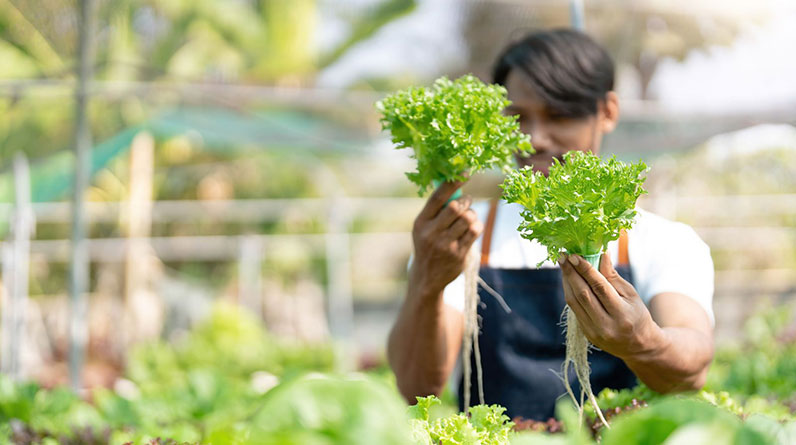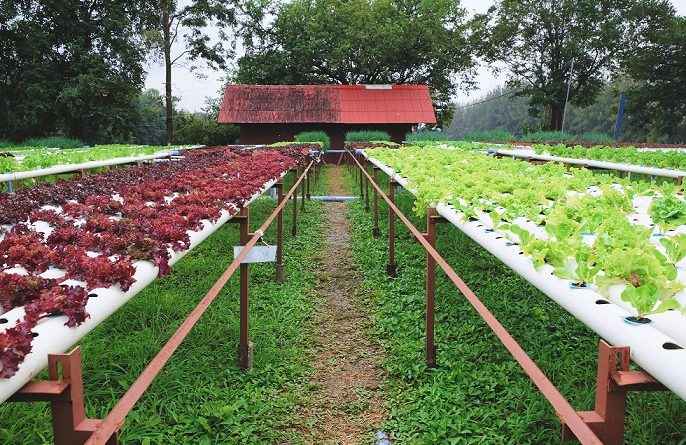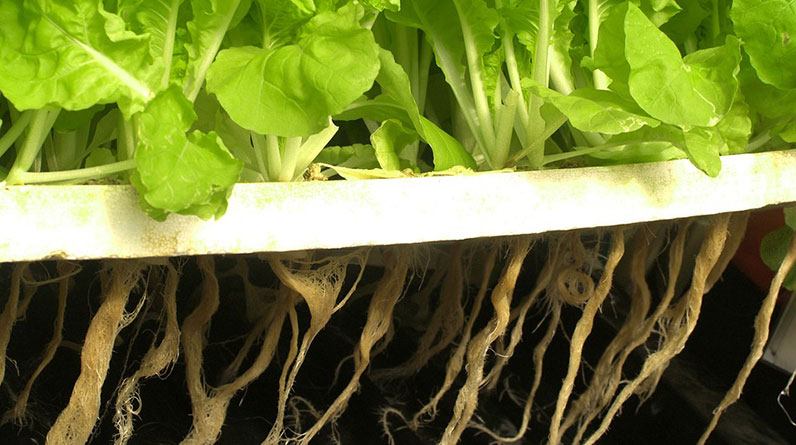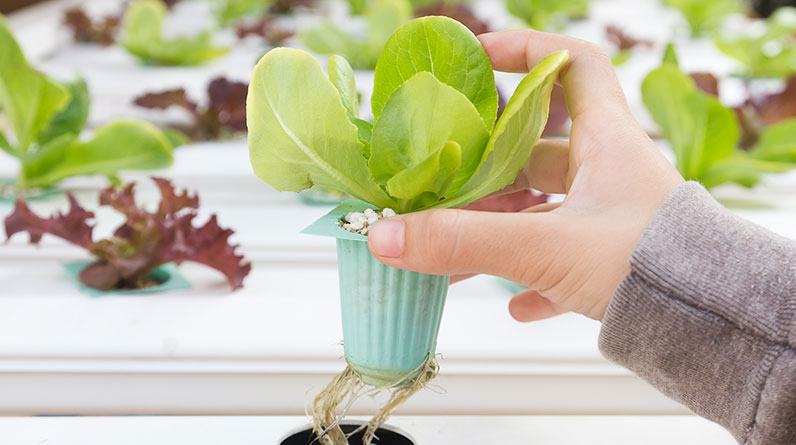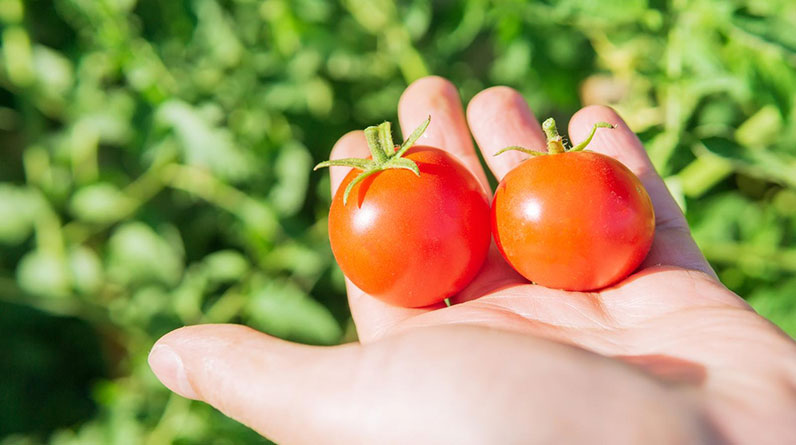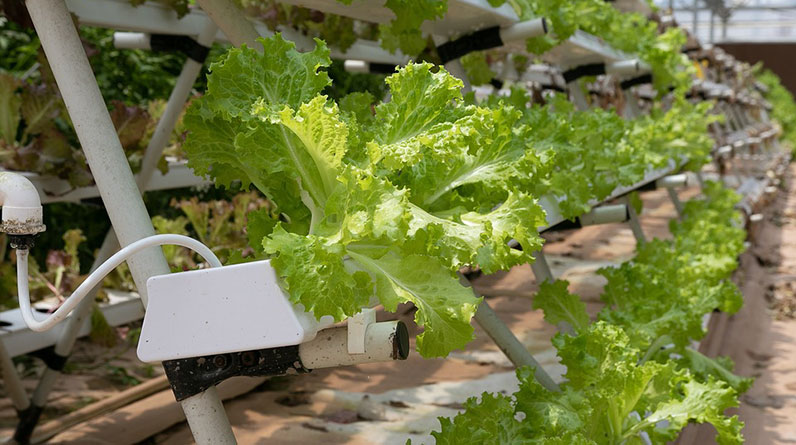
In today’s fast-paced world, where concerns about food safety and environmental sustainability are on the rise, organic hydroponic vegetables have emerged as a promising solution. This innovative farming method combines the principles of organic farming with the efficiency of hydroponics, creating a truly remarkable way to grow fresh produce.
But what exactly are organic hydroponic vegetables? Simply put, they are plants that are cultivated without the use of synthetic pesticides, herbicides, or fertilizers, and are grown in a soilless environment. Instead of relying on traditional soil-based farming techniques, hydroponic systems utilize nutrient-rich water solutions to provide plants with the essential elements they need to thrive.
The benefits of organic hydroponic vegetables are numerous. Firstly, this method allows for year-round cultivation, regardless of the weather or geographical location. By controlling the growing environment, farmers can optimize conditions for plant growth, resulting in higher yields and faster growth cycles. Additionally, hydroponic systems use significantly less water compared to traditional farming methods, making them more sustainable and environmentally friendly.
Furthermore, organic hydroponic vegetables are known for their exceptional taste and nutritional value. By providing plants with the precise nutrients they need, hydroponic systems produce crops that are often richer in vitamins, minerals, and antioxidants. This means that consumers can enjoy fresh, flavorful, and nutrient-dense vegetables all year round.
As we delve deeper into the world of organic hydroponic vegetables, we will explore the various types of hydroponic systems, the different crops that can be grown using this method, and the potential challenges and opportunities that lie ahead. Join us on this exciting journey as we uncover the future of sustainable agriculture and the endless possibilities that organic hydroponic vegetables offer.
What Are Organic Hydroponic Vegetables?
Organic hydroponic vegetables have gained significant popularity in recent years. These vegetables are grown without the use of soil, using a nutrient-rich water solution instead. This innovative method of cultivation allows for the production of high-quality, pesticide-free vegetables that are both nutritious and environmentally friendly.
One of the key advantages of organic hydroponic vegetables is their ability to grow in controlled environments. This means that farmers can eliminate the use of harmful pesticides and herbicides, ensuring that the vegetables are free from chemical residues. Additionally, hydroponic systems allow for precise control over nutrient levels, resulting in healthier and more flavorful produce.
Another benefit of organic hydroponic vegetables is their efficient use of resources. Unlike traditional farming methods, hydroponic systems require significantly less water and land. This makes them ideal for urban areas or regions with limited agricultural space. Additionally, hydroponic systems can be set up indoors, allowing for year-round production and reducing the need for long-distance transportation.
Organic hydroponic vegetables also offer a higher yield compared to traditional farming methods. The controlled environment and optimized nutrient delivery systems enable plants to grow faster and produce more abundant harvests. This not only benefits farmers economically but also helps meet the growing demand for fresh, locally grown produce.
In conclusion, organic hydroponic vegetables are a sustainable and efficient way to grow nutritious and flavorful produce. By eliminating the use of harmful chemicals and optimizing resource utilization, these vegetables offer numerous benefits for both consumers and the environment. With the increasing demand for organic and locally grown food, hydroponic systems are likely to play a crucial role in the future of agriculture.
How Do Organic Hydroponic Systems Work?
Organic hydroponic systems have gained popularity in recent years as a sustainable and efficient way to grow vegetables. But how exactly do these systems work? In this article, we will explore the inner workings of organic hydroponic systems and shed light on their benefits.
At its core, hydroponics is a method of growing plants without soil. Instead, plants are grown in a nutrient-rich water solution that provides them with all the necessary minerals and nutrients. This solution is carefully balanced to ensure optimal plant growth and health.
One of the key components of an organic hydroponic system is the growing medium. This is the material that supports the plants and holds the water solution. Common organic growing mediums include coconut coir, perlite, and vermiculite. These mediums provide stability for the plants’ roots and allow for proper drainage.
Another important aspect of organic hydroponic systems is the use of organic nutrients. Unlike traditional hydroponics, which often relies on synthetic fertilizers, organic hydroponics uses natural and sustainable sources of nutrients. This ensures that the vegetables grown in these systems are free from harmful chemicals and pesticides.
In addition to the growing medium and organic nutrients, organic hydroponic systems also require a well-designed irrigation system. This system delivers the nutrient-rich water solution to the plants’ roots in a controlled and efficient manner. By carefully monitoring the water and nutrient levels, growers can ensure that the plants receive exactly what they need to thrive.
Overall, organic hydroponic systems offer numerous advantages for vegetable growers. They allow for year-round cultivation, minimize water usage, and eliminate the need for soil. Additionally, these systems can be set up in a variety of environments, making them accessible to both small-scale and commercial growers.
In conclusion, organic hydroponic systems are a revolutionary way to grow vegetables. By harnessing the power of water and nutrients, these systems provide an efficient and sustainable method of cultivation. Whether you’re a home gardener or a commercial farmer, organic hydroponic systems offer an exciting opportunity to grow healthy and delicious vegetables all year round.
What Are the Benefits of Organic Hydroponic Vegetables?
Organic hydroponic vegetables have gained popularity in recent years due to their numerous benefits. These vegetables are grown without the use of soil, using a nutrient-rich water solution instead. This innovative method of cultivation offers several advantages over traditional farming techniques.
One of the main benefits of organic hydroponic vegetables is their superior nutritional value. Studies have shown that hydroponically grown vegetables can contain higher levels of vitamins, minerals, and antioxidants compared to conventionally grown counterparts. This is because the plants have direct access to the necessary nutrients, resulting in healthier and more nutrient-dense produce.
Additionally, organic hydroponic vegetables are free from pesticides and other harmful chemicals. Traditional farming often involves the use of pesticides to control pests and diseases. However, these chemicals can leave residues on the produce, which can be harmful to human health. By eliminating the need for pesticides, organic hydroponic farming ensures that the vegetables are safe and free from harmful substances.
Another advantage of organic hydroponic vegetables is their efficient use of resources. Since hydroponic systems recycle water, they require significantly less water compared to traditional farming methods. This makes them more environmentally friendly and sustainable. Additionally, hydroponic systems can be set up in urban areas or areas with limited space, making it possible to grow fresh produce in areas where traditional farming may not be feasible.
In conclusion, organic hydroponic vegetables offer numerous benefits. They are nutritionally superior, free from harmful chemicals, and environmentally friendly. With the increasing demand for organic and sustainable produce, hydroponic farming presents a viable solution for meeting these needs. By embracing this innovative cultivation method, we can enjoy the many advantages of organic hydroponic vegetables and contribute to a healthier and more sustainable future.
Can Organic Hydroponic Vegetables Be Grown Year-round?
Organic hydroponic vegetables have gained popularity in recent years due to their numerous benefits. One question that often arises is whether these vegetables can be grown year-round. The answer is a resounding yes.
With traditional farming methods, seasonal changes and weather conditions can greatly impact the growth and yield of crops. However, hydroponic systems provide a controlled environment where temperature, light, and nutrient levels can be optimized for plant growth. This means that organic hydroponic vegetables can be grown regardless of the season.
One of the key advantages of organic hydroponic systems is the ability to grow plants indoors. This eliminates the dependence on weather conditions and allows for year-round cultivation. By utilizing artificial lighting and temperature control, farmers can create an ideal environment for plant growth, ensuring a steady supply of fresh, organic vegetables throughout the year.
Furthermore, hydroponic systems use significantly less water compared to traditional farming methods. This makes them more sustainable and environmentally friendly. By recycling and reusing water, organic hydroponic farms can minimize water wastage and conserve this precious resource.
In addition to being able to grow vegetables year-round, organic hydroponic systems also offer higher yields and faster growth rates. With precise control over nutrient levels, plants can receive the ideal balance of minerals and vitamins, leading to healthier and more productive crops.
In conclusion, organic hydroponic vegetables can indeed be grown year-round. The controlled environment provided by hydroponic systems allows for optimal growth and higher yields. With the increasing demand for fresh, organic produce, hydroponic farming offers a sustainable solution to meet these needs. So, whether it’s winter or summer, you can enjoy a wide variety of organic hydroponic vegetables all year long.
Are Organic Hydroponic Vegetables More Nutritious Than Soil-grown Vegetables?
Organic hydroponic vegetables have gained significant popularity in recent years, with proponents claiming that they are not only environmentally friendly but also more nutritious than their soil-grown counterparts. But is there any truth to these claims?
When it comes to nutrition, both organic hydroponic and soil-grown vegetables have their advantages. Organic hydroponic vegetables are grown in a controlled environment, allowing for precise nutrient delivery to the plants. This means that the vegetables can receive the exact amount of nutrients they need to thrive, resulting in potentially higher nutrient levels. On the other hand, soil-grown vegetables can benefit from the natural diversity of nutrients present in the soil, which can contribute to a wider range of nutrients in the final product.
One key factor to consider is the quality of the nutrients. Organic hydroponic vegetables are often grown using organic fertilizers, which can result in higher levels of certain nutrients compared to conventionally grown vegetables. However, soil-grown vegetables can also contain a variety of beneficial microorganisms that contribute to the overall nutrient content and bioavailability.
It is important to note that the nutrient content of vegetables can vary depending on several factors, including the specific variety, growing conditions, and post-harvest handling. Therefore, it is difficult to make a blanket statement about the overall nutritional superiority of one method over the other.
In conclusion, both organic hydroponic and soil-grown vegetables have their unique advantages when it comes to nutrition. The choice between the two ultimately depends on personal preferences, environmental considerations, and availability. Regardless of the method chosen, incorporating a variety of vegetables into your diet is key to ensuring a well-rounded nutrient intake.
What Types of Vegetables Can Be Grown Using Organic Hydroponic Systems?
Organic hydroponic systems have gained popularity in recent years due to their ability to produce high-quality vegetables without the use of soil or harmful chemicals. This innovative method of farming allows for the cultivation of a wide variety of vegetables, providing consumers with a diverse range of options when it comes to incorporating fresh and nutritious produce into their diet.
Leafy greens, such as lettuce, spinach, and kale, are some of the most common vegetables grown using organic hydroponic systems. These crops thrive in a hydroponic environment, as they require minimal space and can be harvested multiple times throughout their growth cycle. With the right nutrients and lighting conditions, leafy greens can reach their full potential, resulting in vibrant and flavorful leaves that are perfect for salads and smoothies.
Tomatoes are another popular choice for hydroponic farming. These juicy fruits require a stable water supply and ample sunlight, both of which can be easily controlled in a hydroponic system. By providing the ideal conditions for growth, hydroponic tomatoes can develop a rich flavor and firm texture, making them a favorite among home gardeners and commercial growers alike.
Cucumbers, peppers, and herbs like basil and mint are also well-suited for organic hydroponic systems. These crops benefit from the controlled environment provided by hydroponics, allowing them to grow faster and produce higher yields compared to traditional soil-based farming. Additionally, hydroponic vegetables are less susceptible to pests and diseases, resulting in healthier and more robust plants.
In conclusion, organic hydroponic systems offer a versatile and sustainable method of growing a wide variety of vegetables. From leafy greens to tomatoes, cucumbers, and herbs, the possibilities are endless. By harnessing the power of hydroponics, farmers and home gardeners can enjoy a bountiful harvest of fresh and nutritious produce year-round.
Are Organic Hydroponic Vegetables Environmentally Friendly?
Organic hydroponic vegetables have gained significant popularity in recent years, as more people become conscious of the environmental impact of traditional farming methods. But are these vegetables truly environmentally friendly? Let’s explore this question further.
One of the key advantages of organic hydroponic vegetables is their reduced water usage. Traditional farming methods often require excessive amounts of water, leading to water scarcity in many regions. In contrast, hydroponic systems use up to 90% less water, making them a more sustainable option. This water efficiency not only conserves a precious resource but also reduces the strain on local ecosystems.
Additionally, organic hydroponic systems eliminate the need for harmful pesticides and herbicides. Traditional farming often relies on these chemicals to control pests and weeds, which can contaminate soil and water sources. In contrast, hydroponic systems use natural pest control methods, such as ladybugs or biological controls, ensuring that the vegetables are free from harmful chemicals. This not only benefits the environment but also promotes healthier produce for consumers.
Furthermore, organic hydroponic farming minimizes land usage. With traditional farming, vast amounts of land are required to cultivate crops. However, hydroponic systems can be set up vertically, allowing for more efficient use of space. This means that organic hydroponic farms can produce a higher yield of vegetables using less land, reducing the strain on natural habitats.
In conclusion, organic hydroponic vegetables offer several environmental benefits. Their reduced water usage, elimination of harmful chemicals, and efficient land usage make them a sustainable choice for conscientious consumers. By opting for organic hydroponic vegetables, individuals can support environmentally friendly farming practices and contribute to a healthier planet.
Are Organic Hydroponic Vegetables Safe to Eat?
Organic hydroponic vegetables have gained popularity in recent years, but many people still wonder if they are safe to eat. With concerns about pesticides and other chemicals used in traditional farming methods, it’s no wonder that consumers are seeking out alternative options. But are organic hydroponic vegetables truly a safe and healthy choice?
One of the main advantages of organic hydroponic vegetables is that they are grown without the use of synthetic pesticides or fertilizers. Instead, they rely on natural methods to provide the necessary nutrients for plant growth. This means that the vegetables are less likely to contain harmful residues that can be found in conventionally grown produce.
Additionally, hydroponic systems allow for precise control over growing conditions, such as temperature, light, and water. This means that the risk of contamination from pathogens like E. coli or Salmonella is significantly reduced. In fact, studies have shown that hydroponic systems can actually be more hygienic than traditional soil-based farming.
Furthermore, organic hydroponic vegetables are typically grown in a controlled environment, which means that they are less exposed to pests and diseases. This reduces the need for chemical pesticides and further enhances the safety of the produce.
It’s important to note that while organic hydroponic vegetables offer many benefits, they may not be suitable for everyone. Some people may prefer the taste and texture of conventionally grown produce, while others may have concerns about the environmental impact of hydroponic farming.
In conclusion, organic hydroponic vegetables can be a safe and healthy choice for those looking to avoid synthetic pesticides and fertilizers. With their controlled growing conditions and reduced risk of contamination, they offer a viable alternative to conventionally grown produce. However, it ultimately comes down to personal preference and individual dietary needs.
In conclusion, organic hydroponic vegetables offer a sustainable and efficient way to grow fresh produce. Throughout this post, we have explored various aspects related to organic hydroponic vegetables, including their definition, benefits, and environmental impact.
We have learned that organic hydroponic vegetables are grown without the use of synthetic pesticides or fertilizers, making them a healthier option for consumers. Additionally, these vegetables are grown in a controlled environment, allowing for year-round production and reducing the risk of crop failure due to weather conditions.
One of the key advantages of organic hydroponic systems is their ability to provide optimal growing conditions, resulting in higher nutrient content and better taste compared to soil-grown vegetables. This makes them an excellent choice for individuals seeking a nutrient-dense diet.
Furthermore, organic hydroponic systems can accommodate a wide variety of vegetables, ranging from leafy greens to vine crops. This versatility allows farmers and consumers to enjoy a diverse selection of fresh produce throughout the year.
In terms of environmental impact, organic hydroponic vegetables require less water and land compared to traditional farming methods. They also eliminate the need for harmful chemicals, reducing the risk of pollution and soil degradation.
Looking ahead, the future of organic hydroponic vegetables appears promising. As technology continues to advance, we can expect further improvements in efficiency and productivity. Additionally, there is growing interest in vertical farming, which could revolutionize the way we grow and consume vegetables.
We would like to thank you for taking the time to read this post. We hope you found the information valuable and informative. If you have any questions or feedback, please feel free to leave a comment below. Your input is greatly appreciated.
In conclusion, organic hydroponic vegetables offer a sustainable and efficient way to grow fresh produce. Throughout this post, we have explored various aspects related to organic hydroponic vegetables, including their definition, benefits, and environmental impact.
We have learned that organic hydroponic vegetables are grown without the use of synthetic pesticides or fertilizers, making them a healthier option for consumers. Additionally, these vegetables are grown in a controlled environment, allowing for year-round production and reducing the risk of crop failure due to weather conditions.
One of the key advantages of organic hydroponic systems is their ability to provide optimal growing conditions, resulting in higher nutrient content and better taste compared to soil-grown vegetables. This makes them an excellent choice for individuals seeking a nutrient-dense diet.
Furthermore, organic hydroponic systems can accommodate a wide variety of vegetables, ranging from leafy greens to vine crops. This versatility allows farmers and consumers to enjoy a diverse selection of fresh produce throughout the year.
In terms of environmental impact, organic hydroponic vegetables require less water and land compared to traditional farming methods. They also eliminate the need for harmful chemicals, reducing the risk of pollution and soil degradation.
Looking ahead, the future of organic hydroponic vegetables appears promising. As technology continues to advance, we can expect further improvements in efficiency and productivity. Additionally, there is growing interest in vertical farming, which could revolutionize the way we grow and consume vegetables.
We would like to thank you for taking the time to read this post. We hope you found the information valuable and informative. If you have any questions or feedback, please feel free to leave a comment below. Your input is greatly appreciated.


